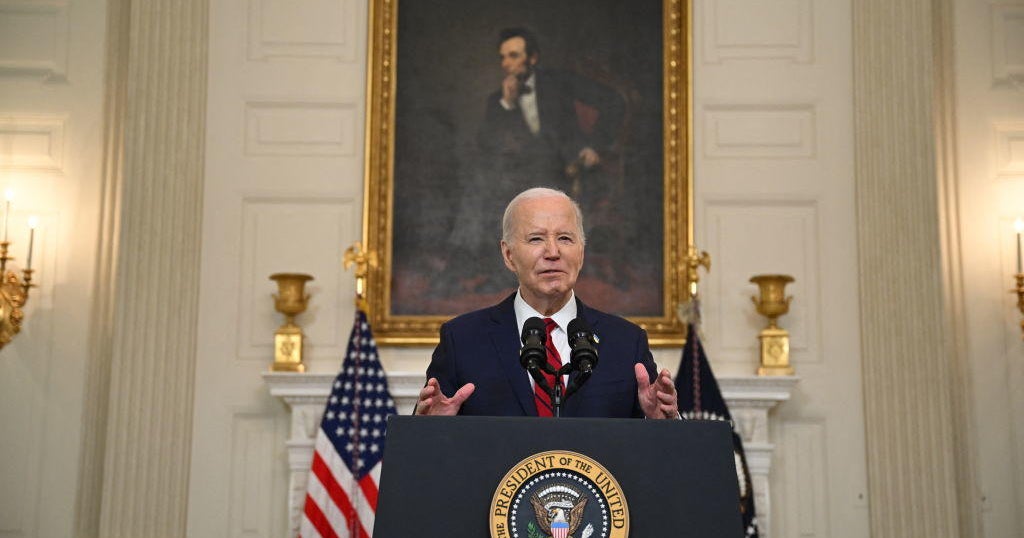GOP-led legal battle looms as Biden administration moves to implement American Rescue Plan
Washington — A legal showdown between the Biden administration and Republican attorneys general over billions of dollars in aid to state and local governments is looming as the federal government prepares to implement the $1.9 trillion American Rescue Plan signed into law this month.
Twenty-one attorneys general have issued a veiled legal threat to the Treasury Department — while Ohio's attorney general has already turned to the courts — over strings attached to the $350 billion for state and local governments reeling from the economic fallout of the coronavirus pandemic.
Under the sweeping package, the money given to states cannot be used for pension funds or to "directly or indirectly" offset tax cuts. Now, the Republican attorneys general are taking aim at the stipulation that money not be spent on tax cuts and warning that the condition unconstitutionally hamstrings their efforts to reduce taxes, even if the tax cuts had been planned before the passage of the American Rescue Plan.
But Treasury Secretary Janet Yellen told the states in a letter Tuesday nothing in the package prevents them from "enacting a broad variety of tax cuts."
"It simply provides that funding received under the act may not be used to offset a reduction in net tax revenue resulting from certain changes in state law," she said. "If states lower certain taxes but do not use funds under the act to offset those cuts — for example, by replacing the lost revenue through other means — the limitation in the act is not implicated."
Yellen further noted that Congress has the authority to place "reasonable conditions" on how states can use federal funding, and such restrictions have been included in legislation concerning funding for Medicaid, education and highways.
The secretary's comments were in response to a letter from the 21 state officials to the Treasury Department last week seeking clarification on the provision, which they said could be interpreted as the federal government attempting to strip states of their authority to implement tax policy.
"This language could be read to deny states the ability to cut taxes in any manner whatsoever — even if they would have provided such tax relief with or without the prospect of COVID-19 relief funds," the officials wrote to Yellen, warning that as written, the provision amounts to "an unprecedented and unconstitutional intrusion on the separate sovereignty of the states."
The letter lists more than a dozen tax cuts or credits under consideration by states that could put their coronavirus aid at risk. Without assurance by Tuesday that the package does not bar states from generally providing tax relief, the attorneys general said "we will take appropriate additional action to ensure that our states have the clarity and assurance necessary to provide for our citizens' welfare through enacting and implementing sensible tax policies, including tax relief."
Georgia Attorney General Chris Carr said the response from Yellen "signals that our coalition was right to fight this unprecedented attempt at federal takeover of state policy."
"In the letter, Treasury provides some assurance and promises to more specifically address the issues we raised," Carr said in a statement to CBS News. "We will be closely monitoring how they do this so that our ability to enact good tax measures, like those signed into law just this week to benefit Georgia families, is not compromised in any way."
But the office of Arizona Attorney General Mark Brnovich indicated it would get the courts involved.
"Secretary Yellen's response raises more questions than answers. Her letter was ambiguous and failed to provide the assurances that states can craft their own tax policies and budgets without being stripped of federal relief funding," Katie Conner, spokesperson for the Arizona Attorney General's Office, said in a statement to CBS News. "We must seek clarification from the court."
Separate from the missive from the 21 attorneys general, Ohio Attorney General Dave Yost is asking a federal court in the state to block enforcement of the condition, arguing the "coercive offer of federal funds" is unconstitutional because Congress exceeded its authority when it passed the mandate.
Because money is fungible, Yost told the court in a request for a preliminary injunction, "any money that a state receives through the act will necessarily offset, either directly or indirectly, every tax reduction that the state might pursue."
"The tax mandate thus gives the states a choice: they can have either the badly needed federal funds or their sovereign authority to set state tax policy. But they cannot have both," he said. "In our current economic crisis, that is no choice at all. It is a metaphorical 'gun to the head.'"
Yost is so far the lone attorney general asking the courts to intervene, but Ilya Somin, a law professor at George Mason University, expects others to follow either by joining Ohio's lawsuit or filing their own unless the Biden administration says it doesn't plan to enforce the provision.
For states challenging the tax provision in the COVID-19 relief package, Somin said a strong argument they have is the lack of clarity about what states must do to receive their share of the money.
The Supreme Court has said conditions attached to the receipt of federal dollars must be established unambiguously and cannot be coercive, and the high court further clarified whether a condition is coercive in its 2012 decision invalidating provisions of the Affordable Care Act that required states to expand their Medicaid programs or risk losing federal Medicaid funding.
"The strongest issue that Republican states have is that it just isn't very clear what the provision means," he told CBS News. "It's not clear whether if you lower taxes at all in any way you forfeit all the money the act would give you or just the amount that you lose through tax cuts. It's also not clear what it means by 'directly or indirectly' using the funds to make up for lost revenue due to tax cuts."
Ohio's case, he said, has teeth for much of the same reasons the Trump administration lost legal battles over efforts to withhold federal money from sanctuary cities that refused to cooperate immigration authorities.
In the instances involving the prior administration, Somin said Congress never clearly authorized the imposition of conditions on state and local governments that received the money the Trump administration was attempting to pull.
"Under Obama administrations, Republican states used the federalism argument to attack Obama's policies. Under Trump, it was blue states and cities that did it, and now we're coming back the other way," Somin said. "It's a common phenomenon, but it shows federalism can protect states of different types of political persuasions."
"The irony," he continued, "is that if this thing fails, it could fail on some of the same bases as the Trump effort to coerce sanctuary cities."
Somin said he is not aware of a similar provision in a law of the same scale as the sweeping coronavirus relief package.
At the heart of the Republicans' challenge to the prohibition is that you "can't have Uncle Sam telling the good folks in Louisiana or Texas how to run their tax systems," Kenneth Manning, a political science professor at the University of Massachusetts at Dartmouth, told CBS News.
"States need the cash," he said of the assistance in the rescue plan. "There are plenty of crumbling schools and beleaguered unemployment systems and the list is endless of what the needs are at the state level. I don't see big tax cuts resulting from this."
President Biden scored a major legislative victory when Congress narrowly passed his $1.9 trillion relief package, and he and his administration's top officials have embarked on a nationwide tour to tout its benefits. Still, more details are expected from the Treasury Department about implementation of the stimulus package.
Under the law, states are poised to receive their federal assistance within 60 days of submitting documentation to the federal government.



